Table of Contents
How to Create a Holistic Life in 7 Key Steps
This page may contain affiliate links. We may earn a commission on purchases, at no additional cost to you. Learn more →
Are you tired of feeling like you’re juggling work, family, and everything else—yet still lacking that deep sense of fulfillment? You’re not alone. I once found myself going through the motions each day, but no matter how many self-help books I devoured or diets I tried, I felt stuck in a cycle of stress and fatigue. Until I discovered the concept of a holistic life—an approach to wellness that unifies mind, body, and spirit— it transformed my health, my outlook, and my overall sense of purpose.
If you’re craving balance and a more meaningful existence, a holistic lifestyle might be exactly what you need. In this article, I’ll walk you through seven essential steps to embrace holistic living. You’ll learn why it matters, how to apply it, and discover practical tips rooted in scientific research and real-life experience. By the end, you’ll have a clear roadmap to nurture your entire being—physically, mentally, emotionally, spiritually—so you can show up each day as the best version of yourself.

What is a Holistic Lifestyle?
A holistic life means caring for every aspect of who you are—your body, your mind, your emotions, and even your environment. Instead of tackling health problems in isolation (like thinking of stress purely as a “mental issue” or diet only as a “weight issue”), holistic living focuses on interconnectedness. For instance, chronic stress can lead to poor eating habits or insomnia, which in turn affect your relationships and mood.
Why does this comprehensive approach matter? Studies show that addressing multiple areas of wellness together yields better physical health, lower stress, and a greater sense of balance. According to a UC Davis mindfulness study, consistently practicing stress-reduction techniques positively affects both mental health and immune function.
It’s about synergy: small improvements in each area add up to significant transformation over time. For more ideas, check out these life-changing holistic habits for even more inspiration.
Five Pillars of Holistic Living
Physical Health
Your body is the vessel for every other pillar. Focus on:
-
Movement: mix strength training, cardio, and mobility for full‑body resilience.
-
Nutrition and diet: fill 80 % of your plate with whole foods, colorful plants, and lean proteins.
-
Sleep: Adults need 7–9 hours; quality rest repairs tissues and consolidates memory
-
Environmental safety: Improve indoor air quality—EPA data show Americans spend 90 % of time indoors, where pollutants can be 2–5 × higher
Mental Health
Brains crave stimulation—and downtime. Incorporate learning and self‑care, set digital boundaries, and give yourself permission to rest.
Emotional Wellness
Feelings drive actions. Journaling, therapy, and supportive friendships help process stress before it becomes disease.
Spiritual Health
Whether faith‑based or secular, connecting to purpose boosts resilience and life satisfaction. Practices like breath prayer, time in nature, or gratitude rituals nurture spiritual health.
Social & Environmental Harmony
Humans are herd creatures. Volunteering, joining local groups, or simply checking in with neighbors fosters balance and harmony beyond the self. Meanwhile, sustainable choices—buying organic cotton non toxic clothing —align personal wellness with planetary health.
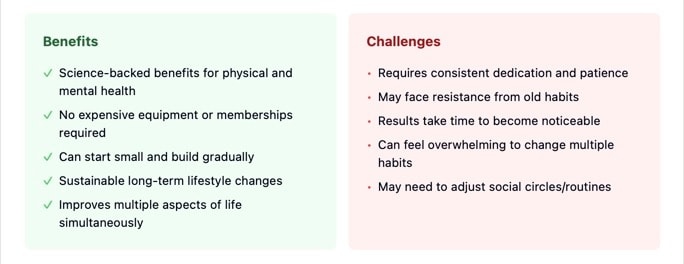
Backed by Science: Benefits of Holistic Living
Some critics still label holistic wellness “woo.” Yet data says otherwise:
-
U.S. adults practicing mindfulness meditation trippled from 4.1 % in 2012 to 14.2 % in 2017
-
Just 15 minutes of running—or an hour of brisk walking—can reduce depression risk by 26 %.
-
The CDC links higher well‑being scores to fewer chronic conditions and longer life expectancy.
-
During tough times like the COVID-19 pandemic, those who received holistic care (addressing physical, mental, and social needs) coped better than those who didn’t. Ignoring these factors led to more depression, anxiety, and loneliness, especially in older adults.
-
Even with complex diseases, looking at the whole person—rather than just treating symptoms—can slow down decline and help people feel better overall
In short, taking care of your whole self—body, mind, and surroundings—really does make a difference. Science is catching up to what many of us have felt all along: holistic living works.
So if you’re craving a more holistic lifestyle, these seven steps will help you integrate mindful habits into your daily routine, creating lasting change
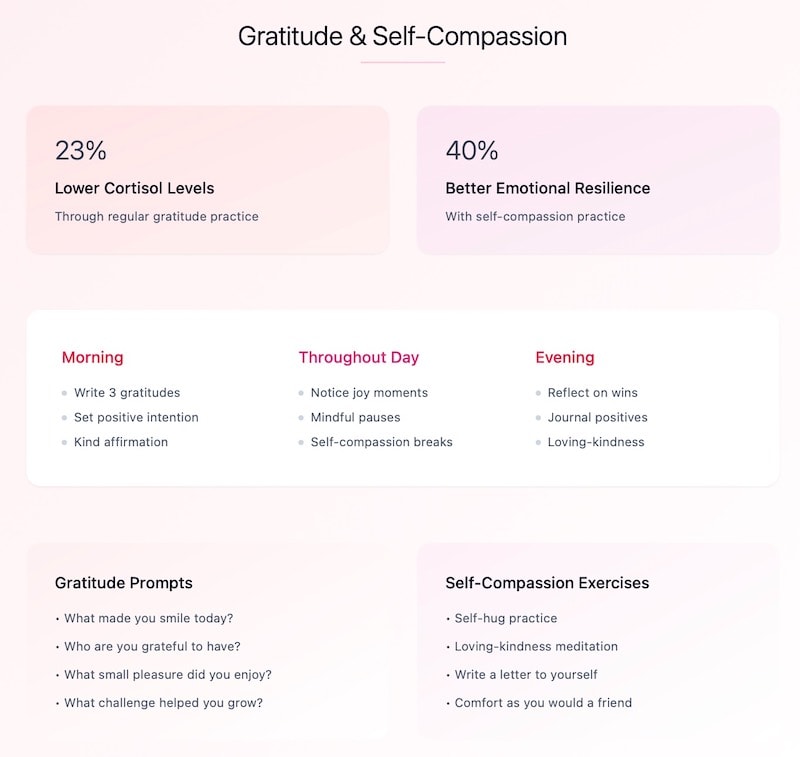
1. Set Your Intentions and Vision
When I first stepped into holistic living, I realized how crucial it was to know what I wanted out of life. Without a clear aim, it’s easy to get swept up in the day’s chaos—social media notifications, urgent work emails, the never-ending to-do list.
-
Reflect on Your Values
Start by journaling about the kind of life you want. Is it more energy? Deeper relationships? Less stress and anxiety? Perhaps you want to tap into your creativity or nurture your spiritual side. By identifying your core values—like compassion, health, family—you’ll have a “compass” that directs your choices. This is how you build a growth mindset, one that welcomes positive change instead of feeling overwhelmed by it.
-
Pinpoint Imbalances
Look at your current routines. Are you skipping exercise because you’re too busy? Eating takeout more than you’d like? Neglecting your friendships? Write these down. Self-awareness is the first step toward effective change. You can’t fix what you don’t acknowledge.
-
Establish Small, Realistic Goals
If you want to exercise more, start with a 10-minute walk each morning. A 2019 psychology study found that clear, measurable goals significantly boost motivation and success rates. Over time, these small wins build momentum. If you need extra motivation in the morning, consider using positive affirmations to set a calm, confident tone for the day.
Pro Tip: Journaling for just 5 minutes can help you “check in” with yourself. Note your mood, energy levels, and what you’re grateful for. Reviewing these entries weekly can reveal patterns and progress.
2. Practice Mindfulness and Cultivate Gratitude & Presence
Stress and anxiety often manifest as physical symptoms, such as headaches or muscle tension, which is why regular mindfulness practice can help you address both mind and body. Being “mindful” means focusing on the present moment—your current thoughts, senses, and surroundings—without judgment. It’s surprisingly simple but incredibly powerful.
Mindfulness also isn’t reserved for long meditation retreats - you can bring it into your everyday life by paying attention to simple tasks, like washing dishes or walking the dog, with full presence.
-
Spiritual Well Being: Meditation & Breathwork
Even five minutes a day of guided meditation or breathwork can reduce stress and anxiety. A meta-analysis published in JAMA Internal Medicine found that mindfulness-based interventions significantly lower stress, anxiety, and even help with mild depression. Techniques like 4-7-8 breathing (inhale for four seconds, hold for seven, exhale for eight) calm the nervous system, making it easier to handle daily challenges.
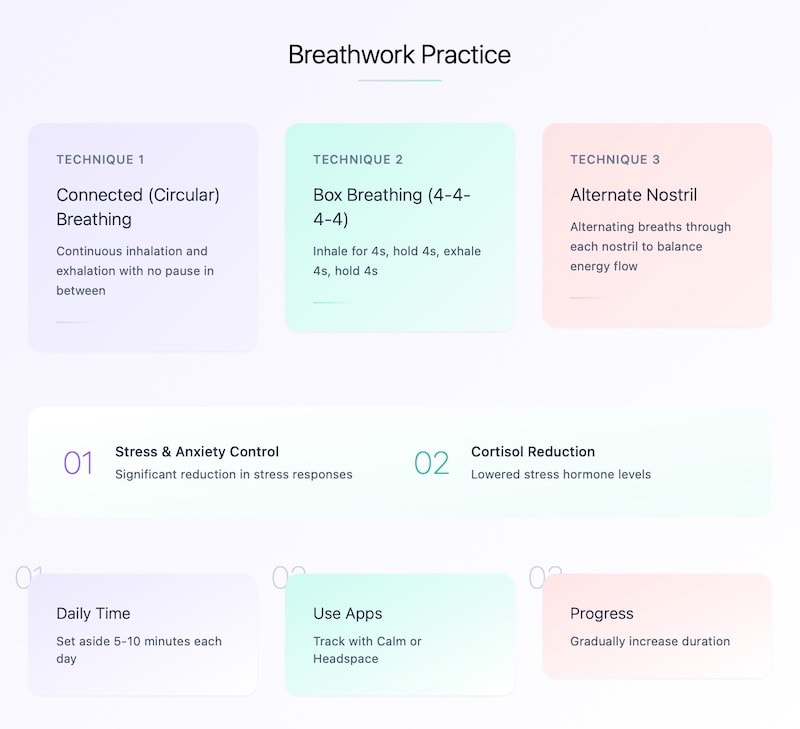
-
Gratitude Journaling
If you’re new to gratitude, start by listing three things each morning that you appreciate—maybe a warm bed, a supportive friend, or a simple cup of tea. Research in the Journal of Happiness Studies reveals that gratitude interventions can lead to notable improvements in overall well-being and decreased depression (4). Keep it short but meaningful. Over time, you’ll train your brain to notice more positives in your life.
-
Stay Present Throughout the Day
Bringing mindfulness to everyday activities can be transformative. Wash dishes while paying attention to the water’s temperature and the scent of the soap. Or, take a mindful walk without headphones, simply observing the sights and sounds around you. By anchoring yourself in the here and now, you’ll realize how much beauty and calm already exist in your life.
Try This: For the first hour after you wake up, stay off your phone. Use that time to stretch, journal, or enjoy a quiet cup of coffee. You’ll be amazed how peaceful your mornings feel.
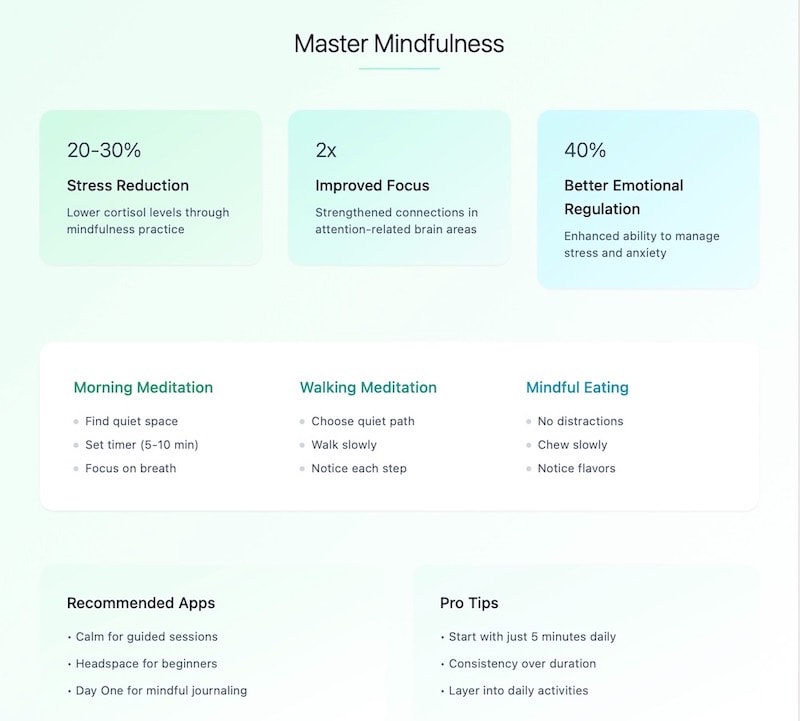
3. Nourish Your Body With Clean Real Foods
When I started my holistic journey, I realized I had been fueling my stress with too much caffeine and mindless snacking. Making conscious food choices became a turning point. A large-scale study from EPIC-Oxford links higher intake of whole, plant-based foods to lower risk of chronic diseases (5). That’s motivation enough for me!
-
Choose Real, Unprocessed Foods
Fill your plate with veggies, fruits, legumes, seeds, whole grains, healthy fats and lean proteins (or high quality plant-based proteins if you’re vegan). These foods are nutrient-dense, supporting both energy and longevity. Over 11 million deaths worldwide are linked to poor diet each year (6), so each wholesome meal is literally an investment in a healthier life.
While the occasional treat can be part of a balanced diet, relying on junk food for quick fixes drains your energy and undermines your holistic lifestyle goal.
-
Stay Hydrated
Water is essential for nearly every bodily function, from regulating temperature to carrying nutrients. If you find plain water boring, try infusing it with lemon, cucumber, or berries.
-
Practice Mindful Eating
Ever eaten an entire bag of chips while barely noticing it? Slow down. Chew thoroughly and pay attention to flavors and textures. Studies suggest mindful eating can prevent overeating by increasing awareness of your fullness cues (7). If late-night snacking is your downfall, set a gentle rule like “no food after 7 p.m.” This is about self-preservation, not self-deprivation.
-
Avoid the Obvious Traps
Refined sugar, excessive alcohol, and ultra-processed snacks zap your energy and compromise gut health. Aim for an 80/20 balance—eating nutrient-dense foods most of the time, and allowing occasional treats without guilt.
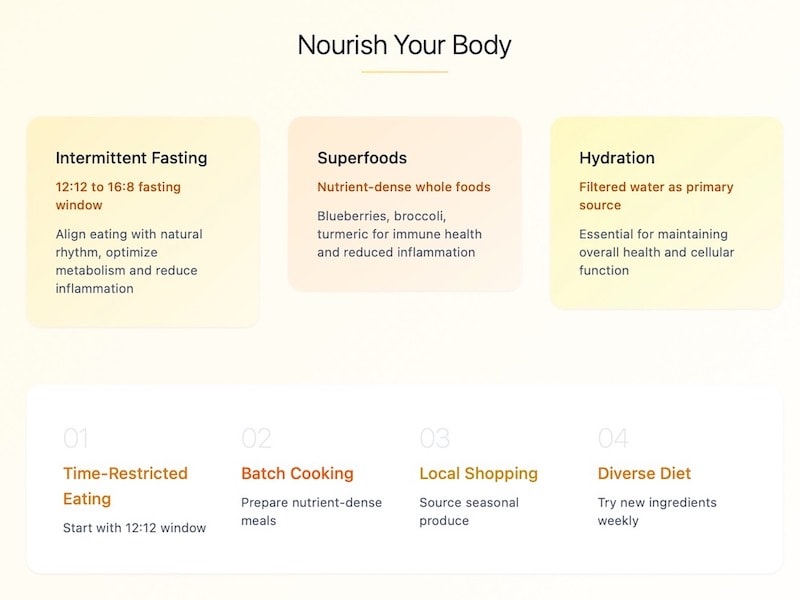
4. Create a Movement Practice That Works For You!
Holistic living isn’t just about meditating and sipping green smoothies; it also calls for physical activity. Regular exercise not only helps you maintain a healthy weight but can reduce stress and improve mental health. In fact, exercise is about 1.5 times more effective than some leading medications for mild to moderate depression (8).
-
Find Movement You Love
The key is to do something you actually enjoy. Yoga is fantastic for flexibility and stress relief. Dance workouts are uplifting if you love music. If the gym feels intimidating, start with a daily walk around your block. Even a 10-minute walk can stabilize mood and clear mental clutter.
If you’re dealing with physical pain—whether from sitting all day or chronic tension—a gentle yoga routine or daily walks can offer significant relief while supporting your holistic life goals.
-
Set Small, Achievable Goals
Move your body for 30 minutes a day. This could be walking, running, swimming, strength training, biking. Anything that gets your heart rate up. Moving your body daily releases stress, boosts energy and improves overall health - stats related.
One study found that short “exercise snacks” throughout the day can be just as beneficial for overall health (9).
-
Mind-Body Connection
Practices like yoga or tai chi encourage mindfulness, merging physical movement with intentional breathing. They can reduce cortisol (the stress hormone) by up to 20% in just a few weeks (10). Give one of them a try if you’re seeking both physical strength and mental calm.
Note: Movement shouldn’t feel like punishment. Your body naturally craves motion. If you’re short on time, try squats or stretching for a minute every hour—it truly adds up over the day.
Did You Know? Even a 10-minute walk can help lower stress and clear your mind. It’s the small, consistent efforts that truly add up in a holistic lifestyle.

5. Prioritize Rest and Quality Sleep
We live in a culture that glorifies hustle, but your body and mind need rest to function at their best. Chronic sleep deprivation increases the risk of obesity, heart disease, and depression (11). Getting 7–8 hours of sleep is essential—not a luxury.
-
Establish a Calming Bedtime Routine
Dim the lights, turn off screens 30 minutes before bed, and consider a relaxing ritual like reading or gentle yoga poses. Screens emit blue light, which can disrupt melatonin production. Improving your sleep quality—by limiting late-night screen time and creating a calming bedtime routine—plays a huge role in boosting overall well-being.
-
Aim for 7–8 Hours
A 2018 survey by the National Sleep Foundation found that 35% of adults fail to get enough sleep (12). If you’re one of them, start by going to bed just 15 minutes earlier each night. Small increments can make a big difference.
-
Take Breaks During the Day
Holistic rest goes beyond night-time sleep. If you’re feeling mentally drained, step away from your tasks for a few minutes. Stretch, breathe, or step outside for fresh air. These micro-breaks can recharge your focus and help prevent burnout.
For more practical tips on sleep, check out sleep hygiene. It’s packed with ideas for creating a bedroom environment that lulls you into deep, restorative rest.
Sleep Tip: Limiting caffeine and heavy meals late at night helps prevent restless nights. Try a calming herbal tea before bed to promote relaxation.

6. Foster Meaningful Relationships
Humans are social creatures. A landmark Harvard study on adult development reveals that strong social connections are the single most important predictor of long-term health and happiness (13). That’s reason enough to invest in better relationships.
-
Spend Time with Positive Influences
Actively seek out people who uplift and inspire you. This might be family, friends, or even an online group with shared interests. A sense of community provides emotional support, motivation, and perspective when life gets tough.
-
Set Boundaries with Negativity
Holistic living means valuing your mental space. If certain individuals consistently drain your energy, it’s okay to limit contact. Kindly but firmly protecting your emotional health is not selfish; it’s self-care.
-
Regular Check-Ins
Schedule “family dinners” or a weekly phone call with a friend. Even sending a quick voice note can help you maintain stronger bonds. Research ties feelings of loneliness to higher rates of depression (14); simply engaging in meaningful conversations can combat that loneliness.
Fun Idea: Create a “social self-care” calendar. Mark time for coffee dates, group hikes, or creative projects with your friends. Consistency matters, just like any other healthy habit.
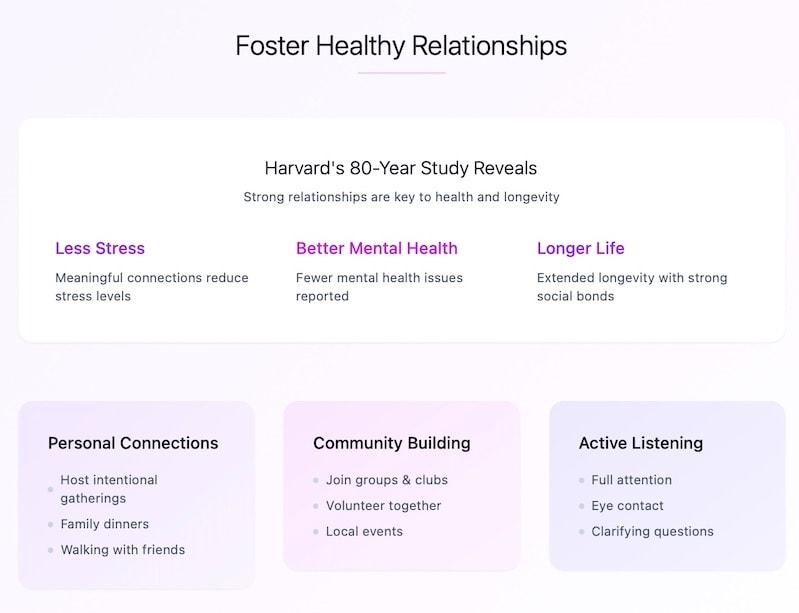
7. Connect With Nature and Simplify Your Environment
We often forget that we’re part of nature. Spending even 20 minutes in green spaces can lower stress hormones and improve mental clarity (15). This step can also encompass simplifying your home environment so it supports—not hinders—your well-being.
-
Spend Time Outdoors
Whether it’s walking barefoot in your yard, hiking a local trail, or reading a book under a tree, nature has a remarkable calming effect. One study in Scientific Reports found that people who spent at least 120 minutes a week in nature reported significantly better health (16). If you can’t manage a hiking trip, a short break in your local park can still boost your mood.
Spending as little as 10 minutes in a natural setting can significantly improve mental health, leading to measurable improvements in mood, stress reduction, and overall well-being, according to a systematic review published in MDPI’s Behavioral Sciences journal.
Your environment includes everything you use daily—cleaners, personal care items, clothing, and even the air you breathe. By opening your windows more often, you can reduce indoor pollutants and let fresh air circulate. Switch to natural materials for your clothing and bedding to minimize exposure to synthetic chemicals. You can also explore simple DIY cleaning solutions, like vinegar and baking soda, which are safer than many store-bought alternatives. For more inspiration, check out the best DIY natural cleaners or dive into non-toxic living tips to keep your home as healthy as you are.
-
Sustainable Habits
Holistic living also extends to the planet’s well-being. Reducing waste, recycling, and choosing eco-friendly products benefits both you and the environment. Check out sustainable living for actionable steps. Even small changes—like bringing reusable bags or using a water filter instead of bottled water—can have a positive environmental impact.
-
Declutter and Digital Detox
A cluttered space often leads to a cluttered mind. Start small, maybe with one drawer or tabletop. Digital detox is another game-changer: turn off notifications for a few hours or designate “no-phone zones” in your home. Research has found excessive screen time correlates with higher stress and sleep disruptions (17), so giving yourself a break is a fast track to mental clarity.

Expert Insights
Here are some expert-backed insights on holistic living, reflecting the latest research and thought leadership:
-
“Holistic health is about the integration of body, mind, and spirit. It’s not about fads—it’s about alignment.”
—Dr. Mimi Guarneri, Cardiologist & Integrative Medicine Specialist -
“Nutrition, movement, sleep, and stress management are the foundational pillars of health. Addressing all of them together is the most effective way to achieve lasting well-being.”
—Dr. Mark Hyman, Functional Medicine Expert
(Source: Dr. Mark Hyman) -
“What you believe, feel, and experience mentally and emotionally shows up in your biology.”
—Dr. Bruce Lipton, Cell Biologist & Author -
“Health is a state of complete harmony of the body, mind, and spirit. When one is free from physical disabilities and mental distractions, the gates of the soul open.”
—B.K.S. Iyengar, Yoga Teacher & Author (Source: Light on Life) -
"Holistic health is not a luxury—it’s a necessity for navigating modern life’s stressors and complexities.”
—Dr. Deepak Chopra, Author & Integrative Medicine Advocate
(Source: Chopra Foundation)
These perspectives reinforce the idea that holistic living is about balance, prevention, and nurturing the whole self—body, mind, and environment. They also highlight the importance of daily choices, from nutrition and movement to mindfulness and environmental awareness.

How Do I Start a Holistic Lifestyle?
Step 1: Audit Your Current Habits
Begin with a simple audit. Notice which area—nutrition, movement, sleep, or relationships—feels most neglected. Tackle one small change at a time, such as walking 10 minutes daily or adding a few more vegetables to each meal. Consistency is key.
Step 2: Set SMART Goals
Instead of “get healthy,” aim for “cook three plant‑based dinners a week.”
Step 3: Layer New Habits
-
Pair morning coffee with a 3‑minute breathing exercise.
-
Walk while listening to an uplifting podcast.
-
Swap one processed snack for fruit daily.
Step 4: Build a Support System
Tell friends, join online communities, or hire a coach. Accountability triples success rates.
Step 5: Integrate Professional Care
Combine regular check‑ups with acupuncture, nutrition counseling, or coaching. This integrative medicine model merges evidence‑based therapies.
Measuring Your Progress
Objective data plus subjective feeling equals true insight. Use these trackers:
-
Biometrics: heart rate, blood pressure, glucose.
-
Mood logs: daily 1–10 rating.
-
Sleep apps: monitor REM and deep sleep cycles.
-
Reflection: monthly journal asking, “Do I feel aligned?”
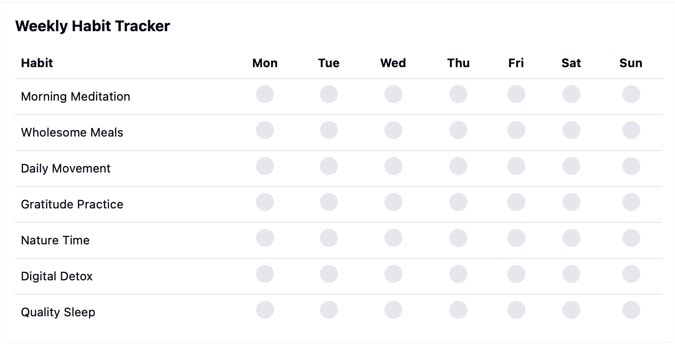
Key Takeaways on Holistic Living
-
Set Clear Intentions: Reflect on what you truly value and where you feel imbalances.
-
Practice Mindfulness: Use meditation, gratitude journaling, and daily presence to cultivate inner calm.
-
Nourish with Whole Foods: Prioritize nutrient-rich meals and consistent hydration.
-
Move Your Body: Aim for enjoyable activities that elevate mood and health—walking, yoga, or dance.
-
Prioritize Sleep: A restful night is non-negotiable for both physical and mental well-being.
-
Foster Relationships: Invest in friendships and community; boundaries matter.
-
Connect with Nature & Simplify: Embrace outdoor time, adopt non-toxic habits, and declutter your space.
References & Suggested Reading
1. APA Monitor on Psychology: Mindfulness reduces stress and boosts immune function
2. Study on goal-setting effectiveness, Current Psychology (doi:10.1007/s12144-019-00369-8)
3. JAMA Internal Medicine: Mindfulness-based interventions meta-analysis
4. Journal of Happiness Studies: Gratitude interventions and depression (doi:10.1007/s10902-011-9302-x)
5. EPIC-Oxford: Vegetarian diet lowers chronic disease risk (doi:10.1007/s10654-020-00630-z)
6. The Lancet: Dietary risk factors lead to 11 million deaths annually (doi:10.1016/S0140-6736(19)30041-8)
7. Mindful Eating research, Appetite Journal (doi:10.1016/j.appet.2018.08.035)
8. Exercise vs. medication for depression, Journal of Affective Disorders (doi:10.1016/j.jad.2023.06.045)
9. “Exercise snacks” summary, Sports Medicine (doi:10.1007/s40279-020-01304-w)
10. Yoga & cortisol reduction, Complementary Therapies in Clinical Practice (doi:10.1016/j.ctcp.2016.03.006)
11. Sleep deprivation risks, CDC: “Insufficient Sleep Is a Public Health Problem”
12. National Sleep Foundation “Sleep in America” poll (www.thensf.org)
13. Harvard Study of Adult Development, Harvard Gazette on relationships and longevity
14. Loneliness & depression, The Lancet Psychiatry (doi:10.1016/S2215-0366(19)30311-1)
15. 20-minute nature walk and cortisol, Frontiers in Psychology (doi:10.3389/fpsyg.2019.00722)
16. 120 minutes in nature threshold, Scientific Reports (doi:10.1038/s41598-019-44097-3)
17. Screen time and sleep disruption, Sleep Health (doi:10.1016/j.sleh.2020.12.006)













